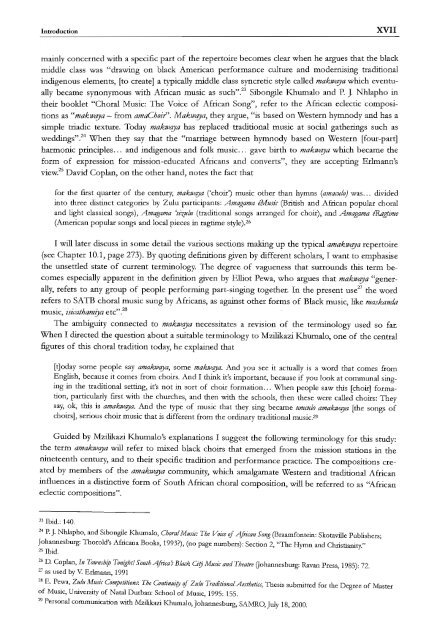South African Choral Music (Amakwaya): Song, Contest and the ...
South African Choral Music (Amakwaya): Song, Contest and the ...
South African Choral Music (Amakwaya): Song, Contest and the ...
Create successful ePaper yourself
Turn your PDF publications into a flip-book with our unique Google optimized e-Paper software.
Introduction XVII<br />
mainly concerned with a specific part of <strong>the</strong> repertoire becomes clear when he argues that <strong>the</strong> black<br />
middle class was "drawing on black American performance culture <strong>and</strong> modernising traditional<br />
indigenous elements, [to create] a typically middle class syncretic style called makwqya which eventually<br />
became synonymous with <strong>African</strong> music as such".23 Sibongile Khumalo <strong>and</strong> P. J. Nhlapho in<br />
<strong>the</strong>ir booklet "<strong>Choral</strong> <strong>Music</strong>: The Voice of <strong>African</strong> <strong>Song</strong>", refer to <strong>the</strong> <strong>African</strong> eclectic composi<br />
tions as "makwqya - from amaChoir'. Makwqya, <strong>the</strong>y argue, "is based on Western hymnody <strong>and</strong> has a<br />
simple triadic texture. Today makwqya has replaced traditional music at social ga<strong>the</strong>rings such as<br />
weddings".24 When <strong>the</strong>y say that <strong>the</strong> "marriage between hymnody based on Western [four-part]<br />
harmonic principles... <strong>and</strong> indigenous <strong>and</strong> folk music... gave birth to makwqya which became <strong>the</strong><br />
form of expression for mission-educated <strong>African</strong>s <strong>and</strong> converts", <strong>the</strong>y are accepting Erlmann's<br />
view. 25 David Coplan, on <strong>the</strong> o<strong>the</strong>r h<strong>and</strong>, notes <strong>the</strong> fact that<br />
for <strong>the</strong> fttst quarter of <strong>the</strong> century, makwqya ('choir') music o<strong>the</strong>r than hymns (amaculo) was ... divided<br />
into three distinct categories by Zulu participants: Amagama i<strong>Music</strong> (British <strong>and</strong> <strong>African</strong> popular choral<br />
<strong>and</strong> light classical songs), Amagama 'siif'lu (traditional songs arranged for choir), <strong>and</strong> Amagama lRagtime<br />
(American popular songs <strong>and</strong> local pieces in ragtime style).26<br />
I will later discuss in some detail <strong>the</strong> various sections making up <strong>the</strong> typical amakwqya repertoire<br />
(see Chapter 10.1, page 273). By quoting definitions given by different scholars, I want to emphasise<br />
<strong>the</strong> unsetded state of current terminology. The degree of vagueness that surrounds this term becomes<br />
especially apparent in <strong>the</strong> defInition given by Elliot Pewa, who argues that makwqya "gener<br />
ally, refers to any group of people performing part-singing toge<strong>the</strong>r. In <strong>the</strong> present use 27 <strong>the</strong> word<br />
refers to SATB choral music sung by <strong>African</strong>s, as against o<strong>the</strong>r forms of Black music, like mask<strong>and</strong>a<br />
music, isicathamrya etc".28<br />
The ambiguity connected to makwqya necessitates a revision of <strong>the</strong> terminology used so far.<br />
When I directed <strong>the</strong> question about a suitable terminology to Mzilikazi Khumalo, one of <strong>the</strong> central<br />
figures of this choral tradition today, he explained that<br />
[t]oday some people say amakwqya, some makwqya. And you see it actually is a word that comes from<br />
English, because it comes from choirs. And I think it's important, because if you look at communal singing<br />
in <strong>the</strong> traditional setting, it's not in sort of choir formation... When people saw this [choir] formation,<br />
particularly fIrst with <strong>the</strong> churches, <strong>and</strong> <strong>the</strong>n with <strong>the</strong> schools, <strong>the</strong>n <strong>the</strong>se were called choirs: They<br />
say, ok, this is amakwqya. And <strong>the</strong> type of music that <strong>the</strong>y sing became umculo amakwqya [<strong>the</strong> songs of<br />
choirs], serious choir music that is different from <strong>the</strong> ordinary traditional music.29<br />
Guided by Mzilikazi Khumalo's explanations I suggest <strong>the</strong> following terminology for this study:<br />
<strong>the</strong> term amakwqya will refer to mixed black choirs that emerged from <strong>the</strong> mission stations in <strong>the</strong><br />
nineteenth century, <strong>and</strong> to <strong>the</strong>ir specifIc tradition <strong>and</strong> performance practice. The compositions created<br />
by members of <strong>the</strong> amakwqya community, which amalgamate Western <strong>and</strong> traditional <strong>African</strong><br />
influences in a distinctive form of <strong>South</strong> <strong>African</strong> choral composition, will be referred to as ''<strong>African</strong><br />
eclectic compositions".<br />
23 Ibid.: 140.<br />
24 P. J. Nhlapho, <strong>and</strong> Sibongile Khumalo, <strong>Choral</strong> <strong>Music</strong>: The Voice of <strong>African</strong> <strong>Song</strong> (Braamfontein: Skotaville Publishers;<br />
Johannesburg: Thorold's <strong>African</strong>a Books, 1993?), (no page numbers): Section 2, "The Hymn <strong>and</strong> Christianity."<br />
25 Ibid.<br />
26 D. Coplan, In Township T011ight! <strong>South</strong> Africa} Black CitY <strong>Music</strong> <strong>and</strong> Theatre Gohannesburg: Ravan Press, 1985): 72.<br />
27 as used by V Erlmann, 1991<br />
28 E. Pewa, Zulu <strong>Music</strong> Competitions: The Continuity of Zulu TraditionalAes<strong>the</strong>tics, Thesis submitted for <strong>the</strong> Degree of Master<br />
of <strong>Music</strong>, University of Natal Durban: School of <strong>Music</strong>, 1995: 155.<br />
29 Personal communication with Mzilikazi Khumalo,Johannesburg, SAMRO,July 18, 2000.

















